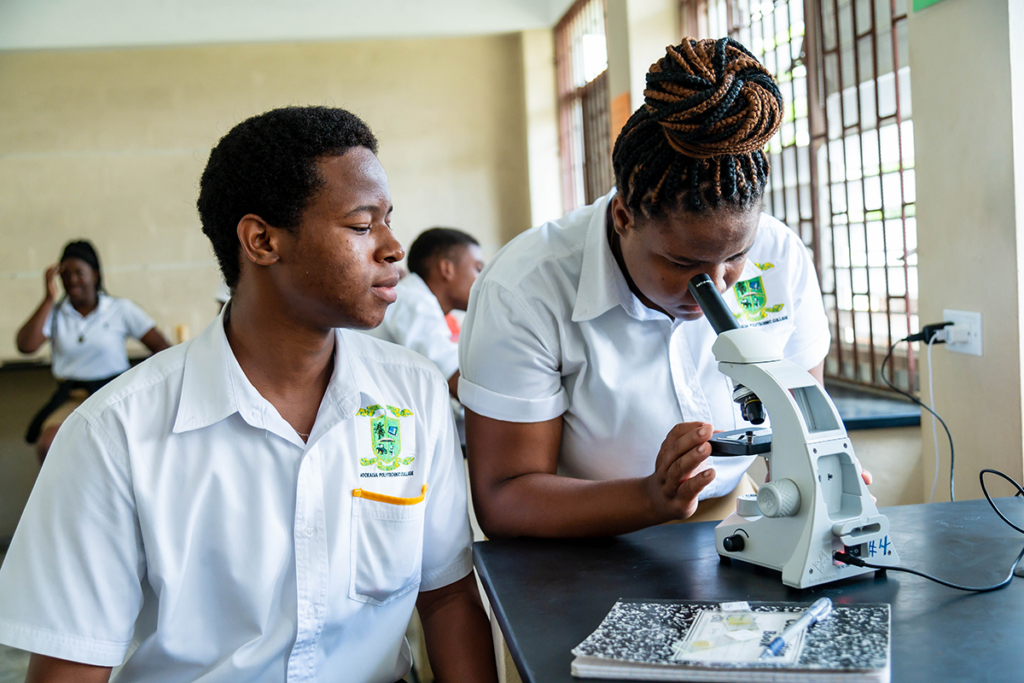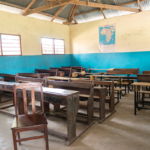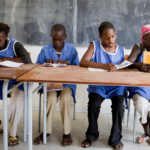Introduction
In this post, present findings from a research study examining factors contributing to retention and attrition of students within tertiary education institutions supported by the LAC Regional Workforce Development Program (), which was funded by USAID and implemented by the Global Education team within FHI 360.
Despite the positive outcomes associated with tertiary education, significant drop-out rates among tertiary education students around the globe persist. For example, in OECD countries, the majority of which are high-income economies, an average 23% of students abandon their studies by the third year, and only 39% complete their degree within the expected timeline. Meanwhile, the lack of systematic, reliable data on tertiary completion rates in many low-income countries makes measuring the phenomenon on a global scale particularly challenging. Given the long-term impacts of tertiary education, understanding the causes of student attrition and how best to support students through their tertiary program is one of the most critical areas of investigation within the field of higher education on a global scale.
In this post, I present findings from a research study examining factors contributing to retention and attrition of students within tertiary education institutions supported by the LAC Regional Workforce Development Program (Advance), which was funded by USAID and implemented by the Global Education team within FHI 360. From 2016-2023, Advance worked to strengthen the educational and operational functions of 12 technical tertiary training institutions in Guatemala, Honduras, Jamaica, and the Dominican Republic, while also providing scholarships to economically disadvantaged youth enrolled in targeted degree programs. Exploration of this topic was triggered by findings from internal monitoring showing that students in partner institutions were dropping out of their degree programs, even when they had been awarded a scholarship covering their fees and expenses. This study was conducted in Jamaica as the Advance team had collected detailed retention data and because partner institutions welcomed the opportunity to understand how to better curtail student attrition.
Methods
The Advance team conducted in-depth interviews with students and Program Coordinators (PCs) from each of the tertiary institutions supported by Advance in Jamaica… Data was analyzed using an applied thematic approach.
This research looked to understand why students who share similar educational, social, and economic backgrounds demonstrate very different retention outcomes, and how a program like Advance could adapt to better support students to degree completion. The study explored three key questions:
- What institutional, programmatic, or individual challenges did students face throughout their academic experience?
- How did these challenges affect students’ ability to progress and graduate?
- What supports or mechanisms enabled students to overcome these challenges?
To answer these questions, the Advance team conducted in-depth interviews with students and Program Coordinators (PCs) from each of the tertiary institutions supported by Advance in Jamaica. PCs were staff hired and paid for by the institutions but whose job responsibilities included overseeing degree programs supported by Advance. Advance invited all 306 youth who had enrolled in a degree program supported by Advance at the time of the study to participate. At the time of the study, close to 40% of these students had graduated, 30% were enrolled and 30% had dropped out. After the initial call for participants, Advance then conducted targeted outreach to youth who had replied to earlier surveys to increase participation.
The final sample was comprised of 29 students, including 14 who had dropped out of the program, six who were enrolled at the time of the study, and nine students who had graduated; as well as six PCs. The original sample included 30 students (11 who dropped out, 9 enrolled and 9 graduated), but during data collection one current student dropped out of the study and two current students informed us they had dropped out of their education programs. Students were aged between 19 and 28 years old. There were 19 female students and 10 male students and 22 of the 29 students received scholarships. All interviews were recorded and transcribed. Data was analyzed using an applied thematic approach. Prior to data collection, the research team developed structural codes related to the key study questions and prominent in relevant literature such as “personal challenge,” “academic challenge,” “administrative challenge,” “financial challenge,” “external support” and “institutional support.” These structural codes were then supplemented with content-based or emergent codes, developed during a close reading of the interview notes such as “student wellbeing,” “program coordinator support” and “decision-making process” which were added to the initial coding framework.
Findings
Students did not know how to get support, and many seemed to doubt they even deserved it, feeling their struggles were their own responsibility and their own fault.
This study demonstrates that students were excited to pursue higher education to gain better economic opportunities for themselves and pave a way toward future opportunities for their communities. However, students faced many personal challenges that, in combination with their educational responsibilities, were difficult to balance and affected their ability to focus on school. Stressors such as childcare, taking care of a sick family member, or a need to contribute to the family income caused fatigue and anxiety that inhibited students from demonstrating their best abilities. A significant number of students had to travel long distances to attend their classes, often putting themselves in unsafe or uncomfortable situations which overtime eroded their motivation to attend classes. Students did not know how to get support, and many seemed to doubt they even deserved it, feeling their struggles were their own responsibility and their own fault. This feeling of helplessness was described by one student as “like slowly drifting away and not even realizing… it’s like drowning and you keep on pulling yourself out of the water.” The inability of institutions to respond dynamically and quickly to changes in student needs or to address unplanned expenses resulted in students lacking the just-in-time support necessary to remain enrolled in their degree program.
The inability of institutions to respond dynamically and quickly to changes in student needs or to address unplanned expenses resulted in students lacking the just-in-time support necessary to remain enrolled in their degree program.
Students at each participating institution also faced a range of administrative and bureaucratic inefficiencies that negatively impacted their academic experience and resulted in a loss of time and resources for students. For example, miscommunication between the Finance and Registrar departments left students without access to the exam portal. Delays in scholarship payments caused undue stress and unnecessary complications for students and inefficient management of scholarship payments had a direct impact on student retention. Students were often left to borrow funds from family or friends to cover essential costs that the scholarship should cover such as transportation or meals. As one student described, navigating the institution’s administration could feel like “a blizzard and you are struggling to find your way through it. You don’t have anybody, and you just have to go through it.” The difficulty students experienced with the administration further reinforced their belief that challenges they faced due to personal circumstances were their own burden to bear and their own to resolve. Covid-19 also caused a major interruption to students’ educational experience as institutions shifted to online courses or limited in-person activities. Even when COVID-19 restrictions were lifted, many institutions continued to use online models. The transition from in-person to virtual participation resulted in a lack of opportunities for students to develop a community at their institution, experience student life, or gain professional experience through development of relationships with staff and other professionals. Institutions became places for administrative transactions, as opposed to educational or social activities. This shift impeded institutional-based support, and consequently weakened students’ sense of belonging and affiliation to their institution and limited their ability to build support networks.
When challenges arose in or outside of school, students struggled exponentially, often resulting in delays in their studies or dropping out altogether.
The challenges above left many students with limited support systems to draw from outside of the resources provided by their academic institutions and the Advance program. Nonetheless, students were hesitant to place any additional burden on parents or caregivers whom they saw as already managing difficult financial and/or emotional circumstances. As a result, when challenges arose in or outside of school, students struggled exponentially, often resulting in delays in their studies or dropping out altogether. Students pointed to lecturers and program staff at each institution whose mentorship and emotional support were essential to their academic journey. Both PCs and youth participating in this study noted that PCs would use their own funds to support students by, for example, buying lunch or providing materials for projects. Students reached out to PCs to advocate to other staff members on their behalf for various academic or administrative challenges. Faculty and staff were extremely dedicated to supporting students’ success but did not have the training or institutional backing to take on the additional stress and strain this work required. As one PC shared, “some days I feel so overwhelmed that I don’t even know where to turn. I don’t think I have enough space [to help all the students]. Too much, too much, is expected from us.”
Conclusion and Implications
Financial assistance alone is not enough to ensure retention and graduation.
As this study demonstrates, scholarships can increase access to tertiary education for students from vulnerable or disadvantaged backgrounds, but financial assistance alone is not enough to ensure retention and graduation.
In the context of Advance, this outcome was particularly true for students from disadvantaged backgrounds as they had limited economic resources or relevant social capital to draw on. Institutional systems, or the lack thereof, were one of the biggest impediments to students’ progress. Although the institutions actively recruited students from vulnerable backgrounds into their programs, they seemed underprepared to address many of the challenges that increased these students’ vulnerability to graduate. Program coordinators, lecturers, and various staff members from across the institutions worked hard to resolve the many challenges students faced through advocacy, advice, personal finances and at times, simple prayer. This patchwork of support resulted in exhausted PCs and lecturers and too few resolved issues.
While students are responsible for the time, effort, and resources they invest in their education, tertiary institutions must be held equally accountable for providing the systems and support necessary to ensure students can graduate and reap the full reward of their investment.
Future programming needs to invest heavily in ensuring institutions establish robust systems and processes that consider the needs and experiences of students first and foremost and which place student success at the center of institutions’ goals, planning, and investment. While students are responsible for the time, effort, and resources they invest in their education, tertiary institutions must be held equally accountable for providing the systems and support necessary to ensure students can graduate and reap the full reward of their investment. Institutional tools such as early warning systems that help staff identify, track and support students at risk of dropping out, expanded mental health services that can steer students through difficult times, career counseling to build excitement and possibility for the future and mentorship models that help students feel connected to their institutions are all interventions that can enable better retention. As tertiary institutions around the globe declare commitments to expanding access to higher education, it is important institutions continue to develop and test innovations and approaches that ensure all students, particularly those coming from vulnerable backgrounds cross the finish line.
Sharing is caring!




